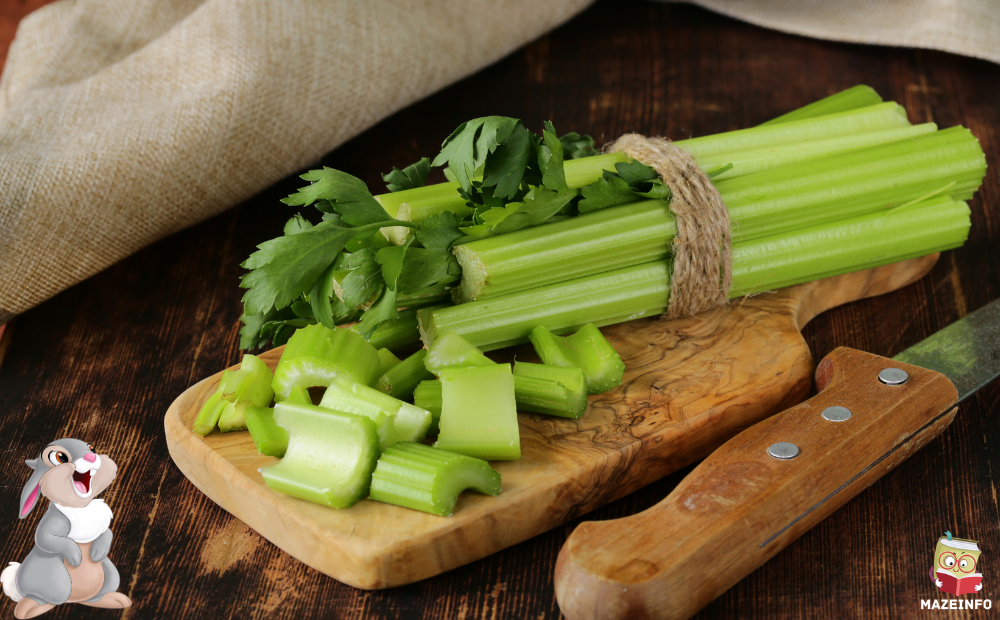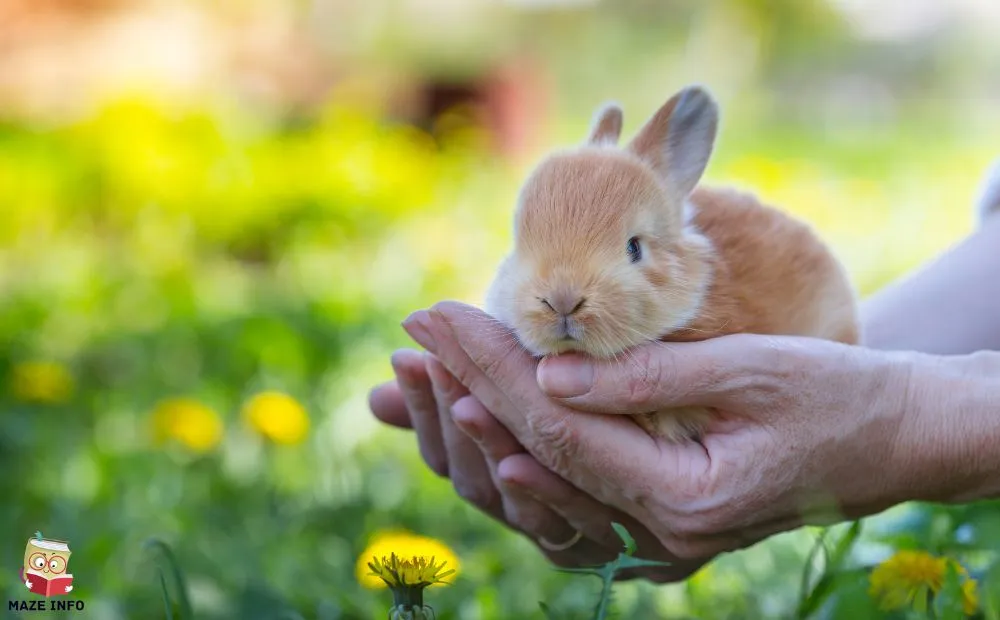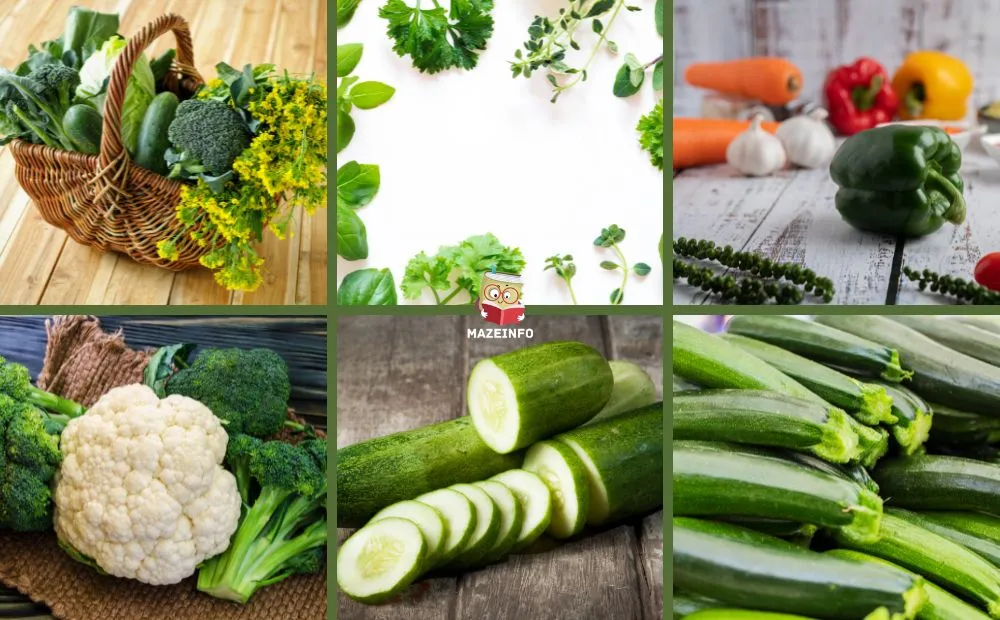Rabbits are charming, gentle creatures that captivate pet owners with their playful nature and delicate features. As with any pet, ensuring they receive proper nutrition is paramount to their health and happiness. A common query among rabbit owners is, “Can Rabbits Eat Celery?” This question stems from the desire to diversify their pets’ diets while ensuring their safety and well-being. In this article, we will delve into the nutritional aspects of celery, its benefits and potential risks for rabbits, and best practices for incorporating it into their diet. By the end, you’ll have a comprehensive understanding of whether celery is a suitable treat for your furry rabbits.
Nutritional Benefits of Celery for Rabbits

Celery, scientifically known as Apium graveolens, is a crunchy and flavorful vegetable enjoyed by humans in various culinary preparations. However, its suitability and benefits for rabbits extend beyond its human consumption. Rabbits, being herbivores, thrive on a diet rich in fresh vegetables, and celery can be a nutritious addition when appropriately incorporated into their feeding rabbits regimen. Let’s delve into the nutritional advantages that celery offers to rabbits.
Low-Calorie and Fibrous
Celery is renowned for its low-calorie content, making it a healthy option for rabbits prone to obesity. Additionally, its high fiber content aids in maintaining digestive health in pet rabbit food, preventing issues like gastrointestinal stasis and promoting regular bowel movements.
Essential Vitamins and Minerals
Celery is a rich source of essential vitamins and minerals beneficial for rabbit health. It contains vitamin K, crucial for blood clotting and bone health, along with vitamin C, an antioxidant that supports the immune system. Furthermore, bunny diet celery provides minerals such as potassium, which helps regulate fluid balance and muscle function, and manganese, important for enzyme activation and bone development.
Hydration Support
The high water content of celery makes it a hydrating option for rabbits, especially during warmer seasons. Adequate hydration is vital for overall well-being and organ function in rabbits, best bunny food making celery a refreshing and nutritious choice to supplement their water intake.
Dental Health
The fibrous nature of celery promotes chewing, which is beneficial for rabbit dental health. Chewing on fibrous vegetables like celery helps wear down their continuously growing teeth, preventing dental problems such as overgrowth and malocclusion.
Moderation and Preparation
While celery offers numerous nutritional benefits, it’s crucial to introduce it to rabbits gradually and in moderation. Abrupt dietary changes can upset their delicate digestive systems. Wash celery thoroughly to remove any pesticides or contaminants before offering it to rabbits. Additionally, chop celery into small, manageable pieces to prevent choking hazards and facilitate easier chewing and digestion.
How to Safely Feed Celery to Your Rabbit

Rabbits are adorable pets that require a balanced diet to thrive. One vegetables for rabbits that can be included in their diet is celery, known for its crunchy texture and nutritional value. What to feed wild rabbits However, it’s essential to introduce celery safely to ensure your rabbit’s health and well-being.
Choose Fresh and Organic Celery: When selecting celery for your rabbit, opt for fresh, organic produce. Avoid celery that shows signs of wilting or decay, as it may contain harmful bacteria or pesticides. Fresh celery ensures your rabbit receives maximum nutritional benefits.
Wash Thoroughly: Before feeding celery to your rabbit, wash it thoroughly under running water. This step removes any dirt, pesticides, or contaminants that could be harmful to your pet. Ensuring cleanliness is crucial for your rabbit’s health.
Cut into Small Pieces: After washing, cut the celery into small, manageable pieces. Rabbits have sensitive digestive systems, so cutting the celery helps prevent choking and aids in digestion. Aim for bite-sized pieces that are easy for your rabbit to chew.
Introduce Gradually: When introducing celery into your rabbit’s diet, do so gradually. Start with small portions to allow your rabbit’s digestive system to adjust. Monitor your rabbit for any signs of digestive upset, such as diarrhea, and adjust the amount accordingly.
Monitor Consumption: While celery can be a healthy addition to your rabbit’s diet, it should not be the primary food source. Monitor your rabbit’s overall vegetable intake to ensure they are receiving a balanced diet. Celery should be offered as part of a variety of vegetables and hay.
Remove Uneaten Portions: After feeding celery to your rabbit, remove any uneaten portions promptly. Leaving food out for extended periods can lead to spoilage and potential health issues for your pet. Keeping the feeding area clean helps maintain your rabbit’s health and hygiene.
Consult a Veterinarian: If you have any concerns about incorporating celery or any other food into your rabbit’s diet, consult a veterinarian. They can provide personalized advice based on your rabbit’s age, health status, and dietary needs.
Also, Read More: How To Care For Newborn Rabbits?
Potential Risks and Considerations
Rabbits, often cherished as pets for their adorable demeanor and gentle nature, have specific dietary needs that must be met for their optimal health. While celery is generally safe for rabbits, there are some potential risks and considerations to keep in mind.
Potential Risks
- Choking Hazard: Rabbits have a tendency to gulp their food quickly, and celery, if not cut into small pieces, can pose a choking risk.
- High Water Content: While celery contains significant water content, excessive intake can lead to diarrhea in rabbits, potentially causing dehydration and electrolyte imbalances.
- Pesticide Residues: If not organically grown or properly washed, celery can harbor pesticide residues that may be harmful to rabbits’ sensitive digestive systems.
- Calcium and Oxalates: Celery contains oxalates, which can bind with calcium and form crystals, potentially leading to urinary issues like bladder sludge or stones if consumed in large amounts.
Considerations
- Moderation is Key: Offering celery to rabbits in moderation, as an occasional treat rather than a staple food, can help mitigate potential risks associated with its consumption.
- Preparation Matters: Always wash celery thoroughly to remove any pesticide residues and cut it into small, manageable pieces to reduce choking hazards.
- Variety in Diet: Celery should be part of a diverse diet for rabbits, including hay, fresh vegetables, and a small amount of pellets formulated specifically for rabbits to ensure nutritional balance.
- Monitor for Digestive Issues: After introducing celery or any new food, monitor your rabbit for any signs of digestive discomfort such as bloating, diarrhea, or changes in appetite.
Alternative Vegetables for Rabbit Diets

When it comes to crafting a balanced and nutritious diet for your beloved rabbit, wild bunny food incorporating a variety of vegetables is key. While celery is generally considered safe for rabbits in moderation, there are several other vegetables that can complement their diet and offer a range of nutrients. As a professional content writer specializing in pet care, best rabbit food I’ll guide you through some excellent alternatives to celery that can enhance your rabbit’s mealtime experience.
Leafy Greens
Leafy greens are a staple in a rabbit’s diet due to their high fiber content and nutrient density. Options like kale, spinach, romaine lettuce, and Swiss chard are excellent choices. These greens provide essential vitamins such as A, C, and K, along with minerals like calcium and potassium. Incorporating a variety of leafy greens ensures that rabbits receive a balanced diet while promoting healthy digestion and overall vitality.
Herbs
Fresh herbs not only add flavor to a rabbit food list but also contribute valuable nutrients. Herbs like parsley, cilantro, basil, and dill are low in calories and rich in vitamins and antioxidants. They can be offered as occasional treats or mixed into the rabbit’s daily vegetable servings to enhance the nutritional profile of their diet.
Carrots
Carrots are a popular choice among rabbits, known for their sweet taste and crunchy texture. They are rich in beta-carotene, a precursor to vitamin A, which is essential for maintaining healthy vision and skin. However, due to their higher sugar content compared to leafy greens, bunny food carrots should be given in moderation to prevent weight gain and dental issues.
Bell Peppers
Colorful bell peppers are not only visually appealing but also nutritionally beneficial for rabbits. They are high in vitamin C, an antioxidant that supports the immune system and helps in collagen production. Offering bell peppers in various colors adds variety to the rabbit diet while providing essential nutrients for overall health.
Broccoli and Cauliflower
While broccoli and cauliflower should be given in small amounts due to their potential gas-inducing properties, they offer valuable nutrients. These cruciferous vegetables are rich in vitamins, including vitamin C and folate, rabbit food as well as minerals like potassium and manganese. Introducing them gradually allows rabbits to benefit from their nutritional value without digestive issues.
Cucumber
Cucumber is a hydrating vegetable that rabbits enjoy, especially during hot weather. It is low in calories and provides a refreshing treat while contributing vitamins such as A and C. Including cucumber in the rabbit’s diet adds variety and helps maintain hydration levels.
Zucchini
Zucchini is another low-calorie vegetable that rabbits can safely consume. It offers vitamins A and C, along with potassium, which supports heart health and proper muscle function. Adding zucchini to the rotation of vegetables provides nutritional diversity and ensures rabbits receive a well-rounded diet.
Conclusion
Certainly, rabbits eat celery in moderation. This vegetable can be a healthy addition to their diet due to its low-calorie content and high fiber, vitamins, and minerals. However, it’s important to note that celery should be given as a treat and not as a primary food source. Rabbits primarily need hay, fresh water, and a small amount of rabbit pellets for a balanced bunny diet. Too much celery can cause digestive issues in rabbits due to its high water content and potential for gas.
Therefore, offer celery as an occasional snack along with other rabbit-safe vegetables like carrots, leafy greens, and herbs. What can rabbits eat, Always introduce new foods gradually and monitor your rabbit for any signs of discomfort or digestive upset. Consulting with a veterinarian about your rabbit’s diet is also advisable for personalized guidance.
Frequently Asked Questions (FAQ’s)
Q: How much celery can rabbits eat?
Ans: Celery should be fed to rabbits in small amounts. Too much can cause digestive issues like diarrhea. A couple of small, chopped pieces a few times a week is a good guideline.
Q: Should celery be the main part of a rabbit’s diet?
Ans: No, celery should not be the main part of a rabbit’s diet. Rabbits need a balanced diet that includes hay, fresh vegetables, and a small amount of pellets. Celery can be one of the fresh veggies in their diet.
Q: Are there any risks in feeding rabbits celery?
Ans: While celery is generally safe for rabbits, some rabbits may be sensitive to it. Watch for any signs of digestive upset like bloating or soft stools. If you notice these, limit or remove celery from their diet.
Q: Can rabbits eat celery leaves?
Ans: Yes, rabbits can eat celery leaves as well. They’re safe and contain similar nutrients to the stalks. Just make sure to wash them thoroughly to remove any pesticides or dirt.
Q: What are the nutritional benefits of celery for rabbits?
Ans: Celery is low in calories and high in fiber, which can help with a rabbit’s digestion. It also contains vitamins and minerals like vitamin K, potassium, and folate, which can contribute to their overall health.



